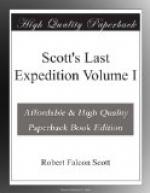The Great God has called me and I feel it will add a fearful blow to the heavy ones that have fallen on you in life. But take comfort in that I die at peace with the world and myself—not afraid.
Indeed it has been most singularly unfortunate, for the risks I have taken never seemed excessive.
... I want to tell you that we have missed getting through by a narrow margin which was justifiably within the risk of such a journey ... After all, we have given our lives for our country—we have actually made the longest journey on record, and we have been the first Englishmen at the South Pole.
You must understand that it is too cold to write much.
... It’s a pity the luck doesn’t come our way, because every detail of equipment is right.
I shall not have suffered any pain, but leave the world fresh from harness and full of good health and vigour.
Since writing the above we got to within 11 miles of our depot, with one hot meal and two days’ cold food. We should have got through but have been held for four days by a frightful storm. I think the best chance has gone. We have decided not to kill ourselves, but to fight to the last for that depot, but in the fighting there is a painless end.
Make the boy interested in natural history if you can; it is better than games; they encourage it at some schools. I know you will keep him in the open air.
Above all, he must guard and you must guard him against indolence. Make him a strenuous man. I had to force myself into being strenuous as you know—had always an inclination to be idle.
There is a piece of the Union Jack I put up at the South Pole in my private kit bag, together with Amundsen’s black flag and other trifles. Send a small piece of the Union Jack to the King and a small piece to Queen Alexandra.
What lots and lots I could tell you of this journey. How much better has it been than lounging in too great comfort at home. What tales you would have for the boys. But what a price to pay.
Tell Sir Clements—I thought much of him and never regretted him putting me in command of the Discovery.
Message to the Public
The causes of the disaster are not due to faulty organisation, but to misfortune in all risks which had to be undertaken.
1. The loss of pony transport in March 1911 obliged me to start later than I had intended, and obliged the limits of stuff transported to be narrowed.
2. The weather throughout the outward journey, and especially the long gale in 83 deg. S., stopped us.
3. The soft snow in lower reaches of glacier again reduced pace.
We fought these untoward events with a will and conquered, but it cut into our provision reserve.
Every detail of our food supplies, clothing and depots made on the interior ice-sheet and over that long stretch of 700 miles to the Pole and back, worked out to perfection. The advance party would have returned to the glacier in fine form and with surplus of food, but for the astonishing failure of the man whom we had least expected to fail. Edgar Evans was thought the strongest man of the party.




